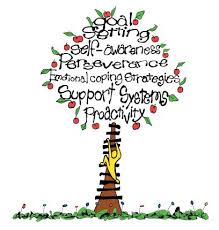 Taking the perspective of the student sometimes requires putting oneself in a new situation. Personally, I have put myself as nearly in their shoes as I can by becoming a teacher at a high school. I’m new to the job, and they’re new to the school and the high school experience.
Taking the perspective of the student sometimes requires putting oneself in a new situation. Personally, I have put myself as nearly in their shoes as I can by becoming a teacher at a high school. I’m new to the job, and they’re new to the school and the high school experience.
I’m being asked to perform while not knowing the systems that are in place; so are the students. I expect there might be better ways to do certain things, but I feel like I need to put in more time and figure it out myself. I don’t like others knowing I’m not sure. Boy, does that mirror what these students are going through.
Recently I’ve been reminded just how much we need our executive skills in order to reduce anxiety; they’re not just there to help us plan and prioritize. When anxiety is high, no new learning happens. At the beginning of the school year, for transitioning students starting at a new school, having reserves of flexibility is crucial in hanging in there in a difficult, unruly or noisy place, like a crowded classroom of 35 freshmen boys, or 7th graders entering a middle school for the first time. Having impulse control helps them not stand out and attract unwanted attention (even though it means they won’t ask questions when they’re lost, too). If the student is uncomfortable, scared, or anxious, he can use some of his self awareness to cope until the situation passes. But while he’s experiencing the unknown, his working memory, metacognition and ability to initiate tasks will be reduced.
If he doesn’t have access to the new online computer system which lists his assignments, then he really can’t initiate the task of doing his homework. He has to be flexible and persistent enough to get that problem solved so that he can get to the next level.
The homework assignments are rolling out relentlessly by now, and the students are struggling with defending themselves from failure. To them, different is bad. If they can’t read the textbook and answer the questions like everyone else, then they conclude that they must be stupid. If they “need” to listen to the textbook on an audio file, it proves that they are inadequate.
It’s damned-if-you-do, damned-if-you-don’t: if you do try an accommodation, you’re admitting that you’re a failure. Yet if you attempt the assignment the same old way as you did before, i.e., staying up until midnight to read 6 pages and answer questions, you will still fail.

Which means, the only way out of this is to do something different. Learning isn’t just effort, nor is it based on how “smart” you are. I admire the ideas developed at the Frostig School, called “Success Predictors.” To succeed at life, it doesn’t matter how smart you are. Being smart does help, in the same way that being wealthy can help, but they are no guarantees that you’ll be able to participate, perform, create, contribute, and live independently. However, if you can develop these six Success Attributes, you can achieve success in adult life:
- Goal Setting
- Self Awareness
- Perseverance
- Emotional Coping Strategies
- Support Systems (i.e., parents)
- Proactivity
Hopefully, since you are reading this blog, you are providing #4 and #5 already to your child. Hopefully, the school is providing information and accommodations, based on #2, you and your child’s awareness of what his/her learning difficulties are. Help your child be open to trying an alternative way to demonstrate knowledge, whether it be using assistive technology or asking someone to read a text out loud if it’s easier to absorb that way. When your child feels supported and understood, he can learn about #1 and #6, from you, from a teacher, or an academic coach or educational therapist — and he may surprise you with his hidden reservoir of grit and willingness. Finally, with some success, #3 becomes attainable and “repeatable”. All good science experiments can be repeated!
All the best to you and your child as you start off a new school year!